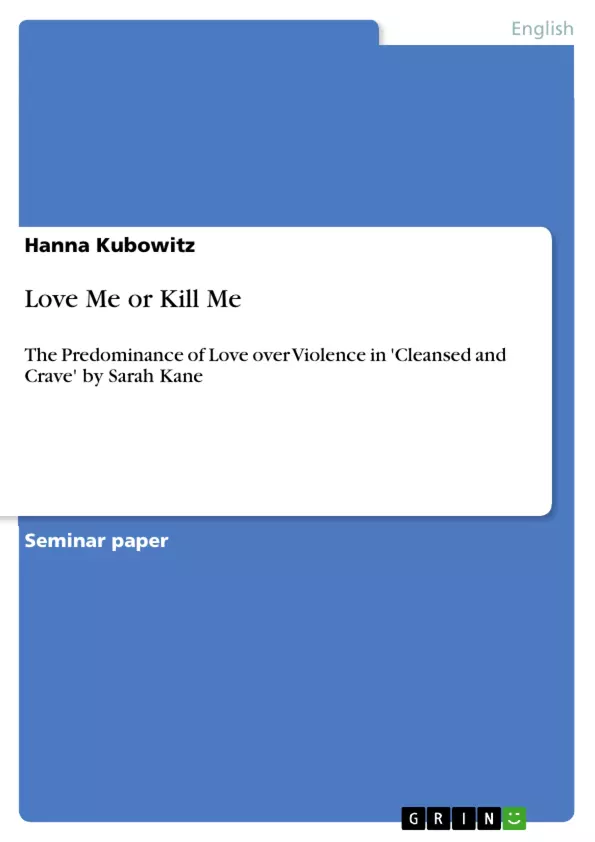"From first to last [the] play is concerned with sexual and physical violence. (…) Nobody (…) will deny that it is the function of the theatre to reflect the horrific undercurrents of contemporary life. But it cannot be allowed, even in the name of freedom of speech, to do so without aim, purpose or meaning." "[The play] isn’t just disgusting, it’s pathetic (…) a lazy, tawdry piece of work without an idea in its head beyond an adolescent desire to shock."
Accusations like these give evidence of how emotional, outraged, and hysterical theatre critics react when challenged by unexpectedly shocking and indigestible performances. It may come as a surprise that the above extracts are neither part of one single critique, nor do they refer to one single play. The first quote refers to Edward Bond’s Saved (1965), whereas the second one refers to the late Sarah Kane’s Blasted (1995). Not incidentally, both playwrights were accused by numerous irritated critics of committing the same unacceptable affront: They were reproached for depicting the most disgusting forms of violence on stage, merely for the sake of paying tribute to violence itself. ....
“Violence shapes and ob¬sesses our society, and if we do not stop being violent we have no future (…) It would be immoral not to write about violence” (Bond 1978: 3). Although accepting and in fact admiring Bond’s decision to comment on his own work, Sarah Kane was always very reluctant about making “authorised” statements concerning her work. Nevertheless, she did provide equally comprehensible or even convincing reasons for putting violence on stage: “If you are saying you can’t represent something, you are saying you can’t talk about it, you are denying its existence, and that’s an extraordinarily ignorant thing to do.”
Yet, paradoxical as it might seem,considering this apparent commitment to the representation of violence, violence is only a marginal topic in all of Kane’s plays. ...
Based on an analysis of the 1998 play Cleansed, this paper aims at a reassessment and revaluation of Sarah Kane’s work: Violence – both physical and emotional – is an important ingredient, and yet only a minor theme in the plays. It is dominated by the all-encompassing theme of love. Love and violence, however, are not examined as two separate individual experiences. On the contrary, it is their overlapping that is scrutinised.
Inhaltsverzeichnis (Table of Contents)
- Introduction
- A fresh approach to the plays of Sarah Kane
- Cleansed and Crave: Love versus Violence
- Conclusion
- Among sex and violence: real art and real heart
Zielsetzung und Themenschwerpunkte (Objectives and Key Themes)
This paper aims to re-evaluate Sarah Kane's work, particularly the play "Cleansed," focusing on the dominance of love over violence. While both physical and emotional violence are crucial elements, they serve as minor themes, overshadowed by the overarching theme of love.
- The complex interplay between love and violence in Kane's plays
- The portrayal of violence in contemporary theatre and its reception
- The significance of love in Kane's work and its role in overcoming violence
- The exploration of emotional and psychological states through intense and often disturbing imagery
- A reinterpretation of Kane's work beyond the shock factor of its violence
Zusammenfassung der Kapitel (Chapter Summaries)
- Introduction: This chapter delves into the initial critical reception of Sarah Kane's work, particularly the controversial portrayal of violence in her plays. It highlights the parallels between her work and Edward Bond's, emphasizing the thematic significance of violence as a reflection of contemporary society. The chapter also explores Kane's own perspective on the depiction of violence, emphasizing its necessity in addressing societal realities.
- Cleansed and Crave: Love versus Violence: This chapter examines the intertwined themes of love and violence in Sarah Kane's works, particularly "Cleansed." It explores the history of violence in theatre, demonstrating that Kane's work, while shocking, is not unprecedented in its use of explicit content. The chapter also discusses the role of sexual content and swear words in Kane's work, placing them within the context of the "In-Yer-Face Theatre" movement.
Schlüsselwörter (Keywords)
This paper examines the works of Sarah Kane, particularly "Cleansed," focusing on themes of love, violence, contemporary British theatre, "In-Yer-Face Theatre," and the complex interplay between emotional and physical violence. It explores the reception of Kane's work and the critical debate surrounding its portrayal of violence. Key concepts include shock value, realism, societal reflection, and the enduring power of love.
Frequently Asked Questions
What is the central argument of the paper regarding Sarah Kane's work?
The paper argues that while violence is a crucial ingredient in Kane's plays, it is actually a minor theme dominated by the all-encompassing theme of love.
Which play by Sarah Kane is analyzed in detail?
The analysis focuses primarily on the 1998 play "Cleansed," as well as "Crave."
How did critics initially react to Sarah Kane's portrayal of violence?
Critics often reacted with outrage and hysteria, accusing her of depicting disgusting forms of violence merely for shock value.
What was Sarah Kane's own justification for putting violence on stage?
Kane believed that refusing to represent something is a way of denying its existence, which she considered an ignorant approach to societal realities.
What is the connection between Kane's work and "In-Yer-Face Theatre"?
Her work is often associated with this movement, which uses explicit content and disturbing imagery to challenge and engage the audience directly.
- Citar trabajo
- Hanna Kubowitz (Autor), 2003, Love Me or Kill Me, Múnich, GRIN Verlag, https://www.grin.com/document/177074



